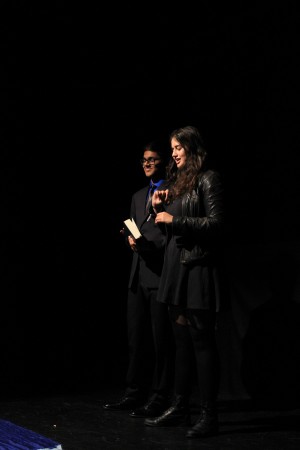Despite brevity, drama’s performance in “The Tempest” stirs up a storm.
Free things are always nice. Free food, free game trials, freeloading, freedom. You can’t go wrong with “free.” Advanced Drama’s rendition of William Shakespeare’s “The Tempest” was good on its own without the benefit of it being free. There’s a lot to love with the show and more even more that will remain in your wallet.

“The Tempest” tells the tale of Prospero, the former duke (duchess in this case) of Milan who was ousted from his throne by his envious brother. Following Prospero’s exile, he and his daughter settle on a Mediterranean island where he, using his knowledge of magic, enslaves several of the island’s natives. Years later, as Prospero becomes ruler, he shipwrecks a transport carrying the three men who he feels betrayed him: his own brother, the King of Naples and the king’s brother. The Prince of Naples, one of Prospero’s old friends and two drunken servants also wash ashore. The play, often seen as a jab at imperialism and oppression of minorities, shifts between soberly grave with Prospero and his temper to ludicrously silly with the servants and their alcohol. Despite the time constraints, the Advance Drama rendition kept true to that duality.
The play did feel rushed, though this is more at fault to the run time than the drama department itself. The movie version, which also featured a female Prospero, took 110 minutes and eight dollars to tell the story in a mediocre fashion. The Advanced Drama’s performance, on the other hand, was a free, pleasant performance that took around 45 minutes.
The lighting and special effects flowed well with the performance. The student directors, seniors Megan Alexandria Chandler and Soham Chowdhury, made some very interesting choices, most notably using a flapping length of blue cloth to represent the sea and having junior Michaela Murphy try to bother the rest of the cast, who were all trying to restrain themselves from responding. The cast themselves filled their roles with color and life, more so than usual, with their costumes ranging across the color spectrum based on their allegiances in the play.

Young lovers Miranda (junior Kaavya Sundar), and Ferdinand (sophomore Prathik Rao) promise their undying love for one another as Miranda’s mother Prospero (senior Rebecca Kao) looks on cautiously. As the youngest and most naive of the characters, the lovers’ hope and love serve to foil and reconcile the older generation’s greed and betrayal.
The actors were excellent with the roles that they had. Senior Rebecca Kao, despite lacking Prospero’s years and old grudges, captured the magical former duke’s intimidating and dominating presence. Junior Kaavya Sundar and sophomore Prathik Rao’s minor romance storyline was cute (one scene in particular elicited a wave of “awwws” from the audience). The actors were able to spice up the rather stagnant main plot and Shakespeare’s clunky exposition with sheer emotion.
The most entertaining part of the play had to be the Caliban-Trinculo-Stephano misadventures. Senior Derek Ching and juniors Sunaina Hajela and Leonie Vullgraf absolutely stole the stage with each drunken appearance. Poor Ching ended up actually kissing Hajela’s boot and was forced into a lady’s dress by the end (the audience had no sympathy in either instance and just laughed). Ching’s tortured monster persona contrasted perfectly with Hajela’s drunkenness and Vullgraf’s gross incompetence.

The drunken Trinculo (junior Sunaina Hajela) drags his friend Stephano (junior Leonie Vullgraf) from the monster Caliban (senior Derek Ching). Numerous references to Caliban as a lowly servant and drunken violence keep the humor in check and remind the audience of some of society’s worst problems.The action scenes, while scarce, seemed a bit awkward. The attempts at slow-mo didn’t work very well in the performance and acting out telepathy in general never works out very well. But, as a student-produced play and not a mainstage performance, the drama students did quite well. “The Tempest” had far less resources and time than a major performance, like the upcoming rendition of “Footloose”, has access to.
It wasn’t mind-shatteringly life changing or the best production since “The Godfather Part II”, but that isn’t the point. The play was a demonstration of the drama students’ capabilities and independence.They showed what they could do on their own with limited resources and made a show well worth performing.







